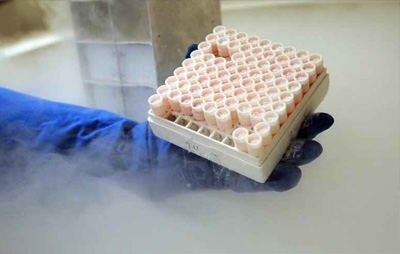Cynomolgus Monkey PBMCs (NHP-PC001)

Category:NHP Peripheral Blood Mononuclear Cell (PBMC) Products
Tag: Cynomolgus Monkey, PBMCs
Tag: Cynomolgus Monkey, PBMCs
- Cynomolgus monkey is mainly used in medical research especially those involved in neuroscience and disease. The cell product is separated from cynomolgus monkey blood. Cells are negative for bacteria yeast fungi mycoplasma and offer a tool for lots of tests and assays, for example, cell-cell interaction, adhesion, migration, PCR, WB, immunoprecipitation, immunofluorescent staining, immunofluorescent flow cytometry, or generating cell derivatives for desired research applications.
Detailed Product Description
- Source: Healthy cynomolgus monkey
- Purity: ≥ 85%
- Applications: Suitable for a wide range of safety assessment and functional assays.
- Organ/Tissue: Blood
Technical Specifications
- Cell Type: Mononuclear cells
- Species: Cynomolgus monkey
- Cryopreservation: Cryopreserved with appropriate cryoprotectant.
- Quality Control: Rigorously control cell purity and viability.
- Cell Status: Cryopreserved
Shipping and storage
- Shipping: Cryopreserved cells are shipped with dry ice overnight. Upon receipt, promptly transfer the frozen cells to liquid nitrogen for storage until they are ready for use. It is important to note that cells should never be stored in -20 °C or -80 °C freezer.
- Storage: Liquid Nitrogen (-180 °C)
Downloadable Resources
FAQs
Customer Reviews
-
Q 1: How are the cells harvested?
A: The PBMCs are isolated using Ficoll-Paque density gradient centrifugation.
-
Q 2: Can I request specific cell counts?
A: Absolutely, please contact us with your specific requirements.
-
Reliable and efficient
By using Cynomolgus Monkey PBMCs, I can cynomolgus monkey PC-specific gene expression. It is very helpful for our research. I recommend it.
Click the button below to contact us or submit your feedback about this product.
Related Products
Online Inquiry
This site is protected by reCAPTCHA and the Google Privacy Policy and Terms of Service apply.
NHP Biologicals from Creative Biolabs are for research, diagnostic, or manufacturing purposes only. They may not be intended for or are not approved for any other use.
Enter your email here to subscribe.
SubmitFollow us on

Copyright © 2026 Creative Biolabs. All rights reserved.

 Cynomolgus Monkey PBMCs
Cynomolgus Monkey PBMCs